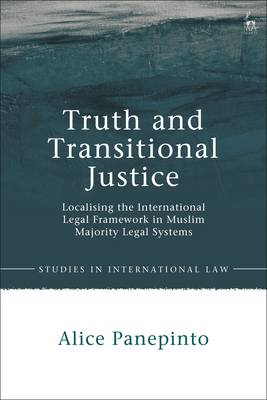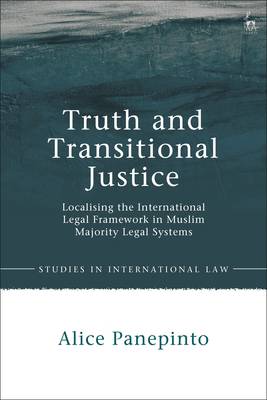
En raison d'une grêve chez bpost, votre commande pourrait être retardée. Vous avez besoin d’un livre rapidement ? Nos magasins vous accueillent à bras ouverts !
- Retrait gratuit dans votre magasin Club
- 7.000.000 titres dans notre catalogue
- Payer en toute sécurité
- Toujours un magasin près de chez vous
En raison de la grêve chez bpost, votre commande pourrait être retardée. Vous avez besoin d’un livre rapidement ? Nos magasins vous accueillent à bras ouverts !
- Retrait gratuit dans votre magasin Club
- 7.000.0000 titres dans notre catalogue
- Payer en toute sécurité
- Toujours un magasin près de chez vous
Truth and Transitional Justice
Localising the International Legal Framework in Muslim Majority Legal Systems
Alice Panepinto
203,95 €
+ 407 points
Format
Description
With a unique transitional justice perspective on the Arab Spring, this book assesses the relocation of transitional justice from the international paradigm to Islamic legal systems.
The Arab uprisings and new and old conflicts in the Middle East, North Africa and other contexts where Islam is a prominent religion have sparked an interest in localising transitional justice in the legal systems of Muslim-majority communities to uncover the truth about past abuse and ensure accountability for widespread human rights violations. This raises pressing questions around how the international paradigm of transitional justice, and in particular its truth-seeking aims, might be implemented and adapted to local settings characterised by Muslim majority populations, and at the same time drawing from relevant norms and principles of Islamic law. This book offers a critical analysis of the relocation of transitional justice from the international paradigm to the legal systems of Muslim-majority societies in light of the inherently pluralistic realities of these contexts. It also investigates synergies between international law and Islamic law in furthering truth-seeking, the formation of collective memories and the victims' right to know the truth, as key aims of the international paradigm of transitional justice and broadly supported by the shari'ah. This book will be a useful reference for scholars, practitioners and policymakers seeking to better understand the normative underpinnings of (potential) transitional truth-seeking initiatives in the legal systems of Muslim-majority societies. At the same time, it also proposes a more critical and creative way of thinking about the challenges and opportunities of localising transitional justice in contexts where the principles and ideas of Islamic law carry different meanings.Spécifications
Parties prenantes
- Auteur(s) :
- Editeur:
Contenu
- Nombre de pages :
- 280
- Langue:
- Anglais
- Collection :
Caractéristiques
- EAN:
- 9781509921263
- Date de parution :
- 24-02-22
- Format:
- Livre relié
- Format numérique:
- Genaaid
- Dimensions :
- 156 mm x 234 mm
- Poids :
- 566 g

Les avis
Nous publions uniquement les avis qui respectent les conditions requises. Consultez nos conditions pour les avis.






